
Takara_Soong
-
Content Count
10,256 -
Joined
-
Last visited
Posts posted by Takara_Soong
-
-
Strip 31: A barbarian is born!
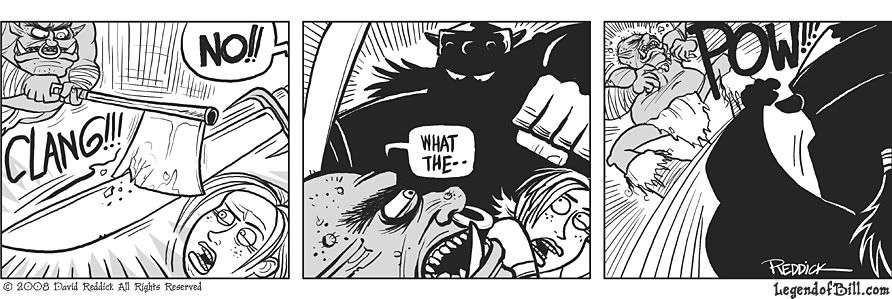
Strip 32: Bill the Barbarian

Strip 33: Our Hero!
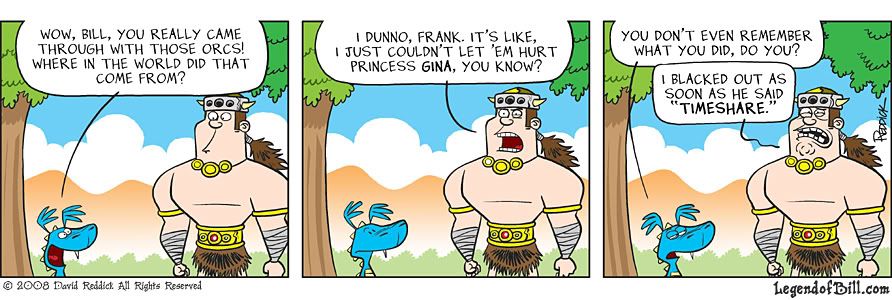
Strip 34: The Manly Man
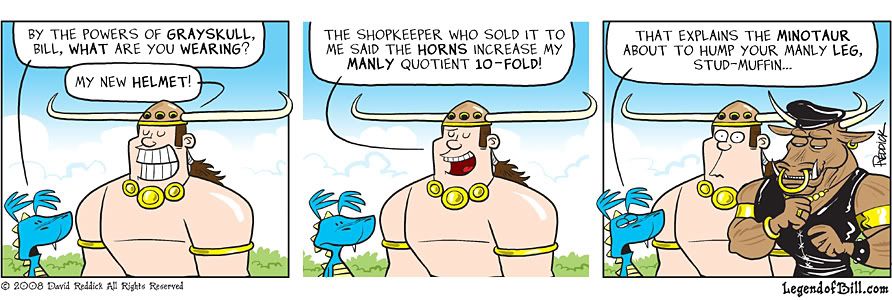
Strip 35: Drinkin' the hard stuff
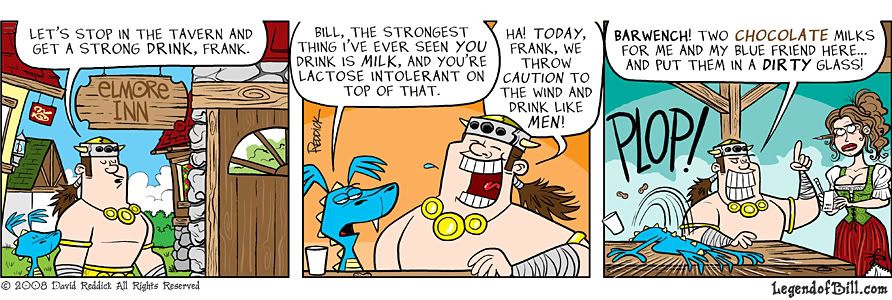
Strip 36: No dragons allowed
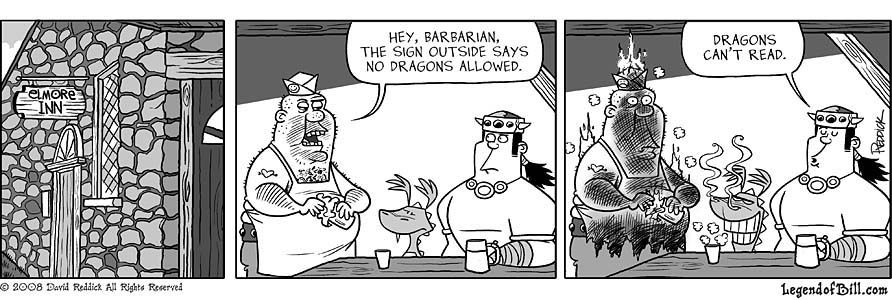
Strip 37: A fly in my soup
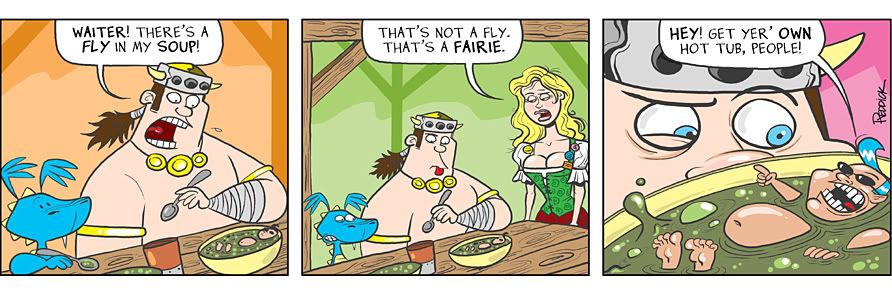
Strip 38: Milk Wenches
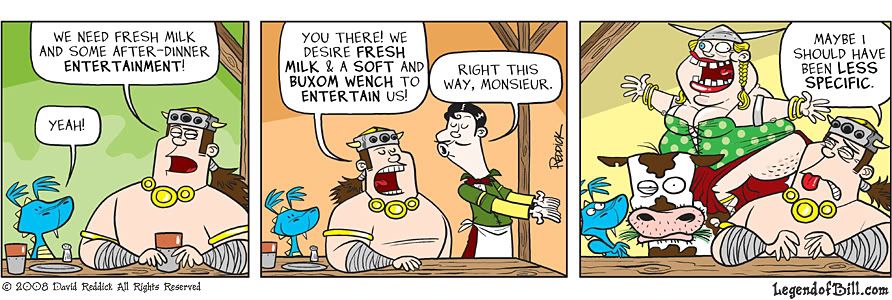
Strip 39: Warriors and cookies
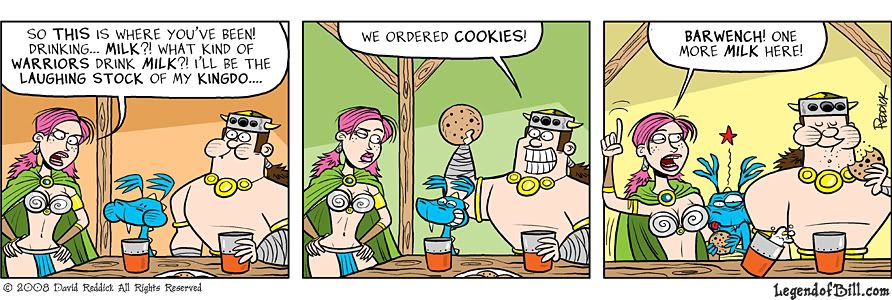
Strip 40: The Dark Lands
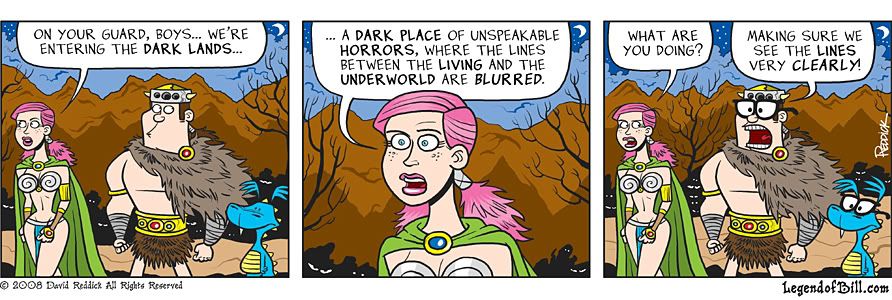
-
Strip 21: Pop Tarts

Strip 22: Barbaric Swordplay
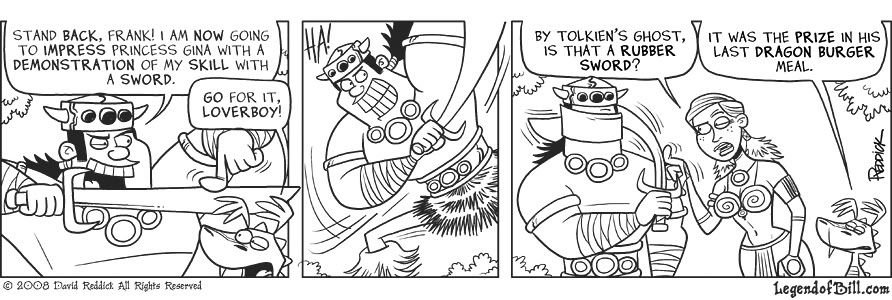
Strip 23: Gesundheit!
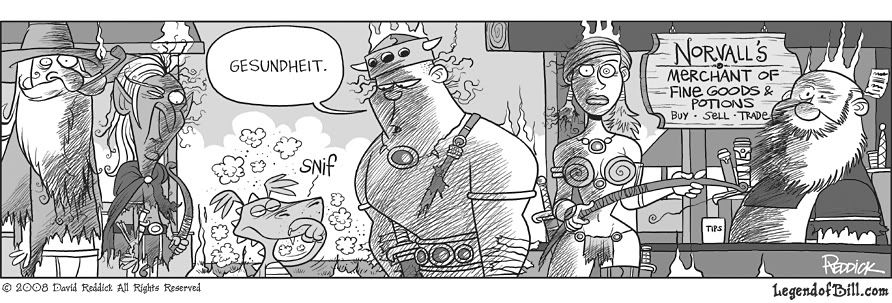
Strip 24: She's all that!

Strip 25: Dragon Breath
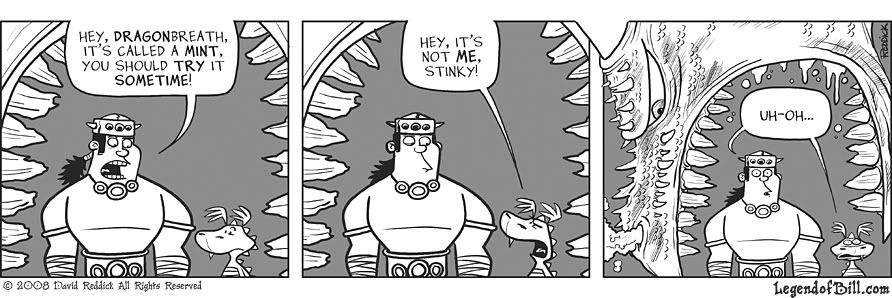
Strip 26: Beware of Medusa
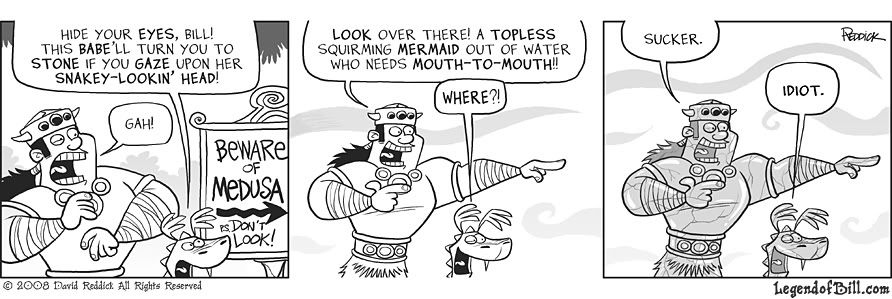
Strip 27: The Orcs are back!
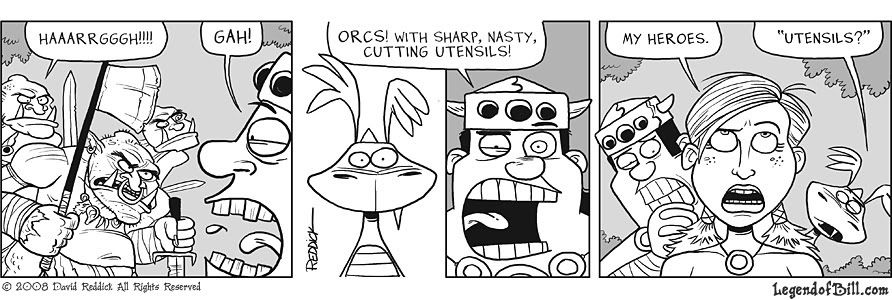
Strip 28: The old day job beckons

Strip 29: Those taxing orcs
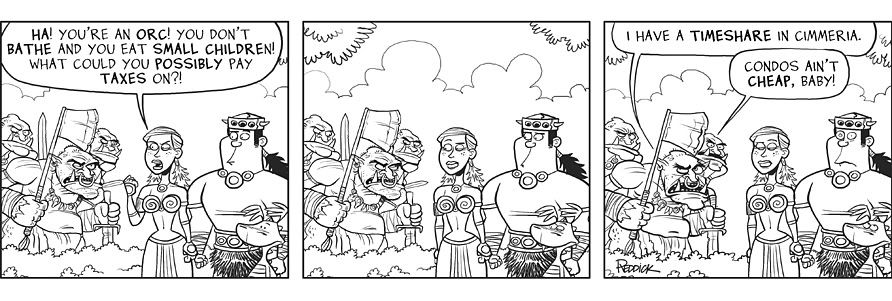
Strip 30: Orcs Revenge!
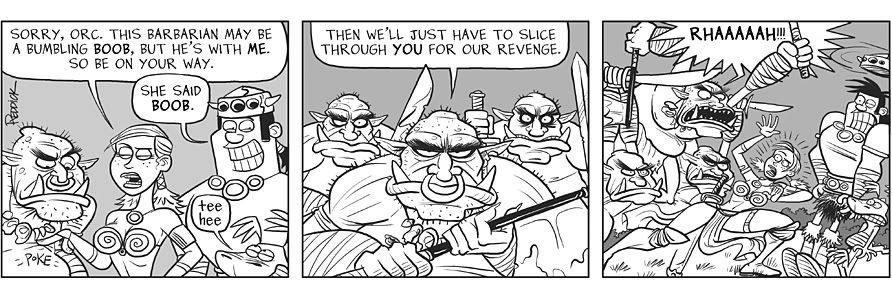
-
Strip 11: Lookin for adventure and whatever comes our way
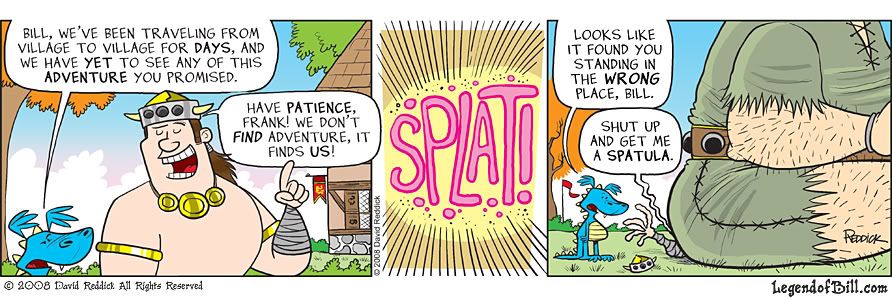
Strip 12: You want fries with that?
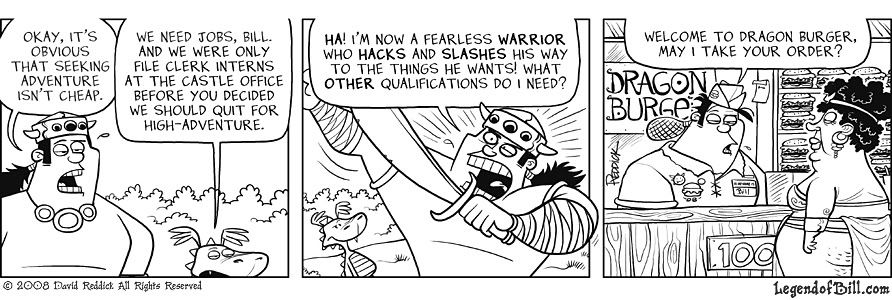
Strip 13: Ah, the barbaric joys of working fast food!
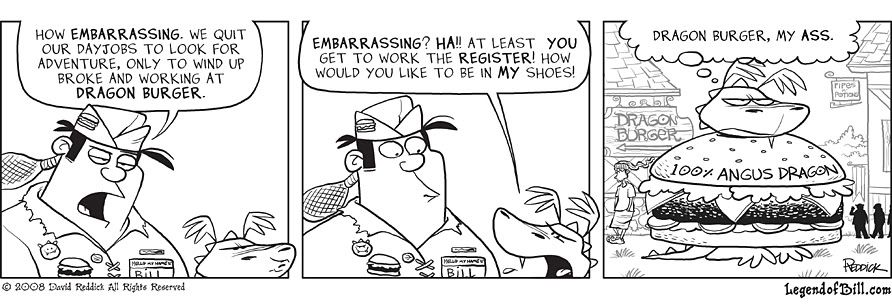
Strip 14: Tastes like chicken
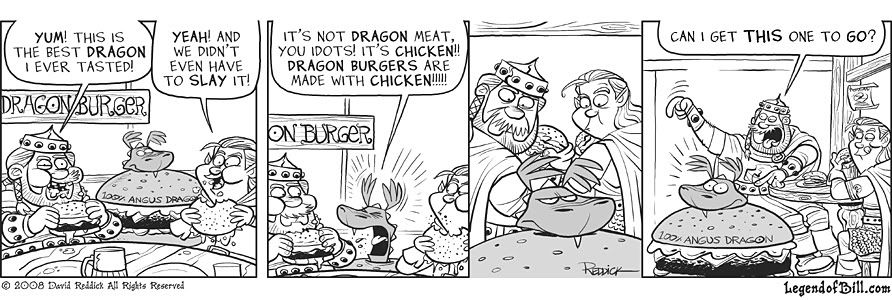
Strip 15: French Fry Frank
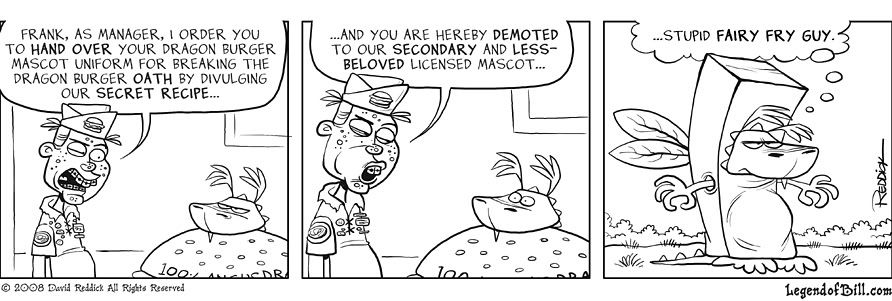
Strip 16: Unemployed again
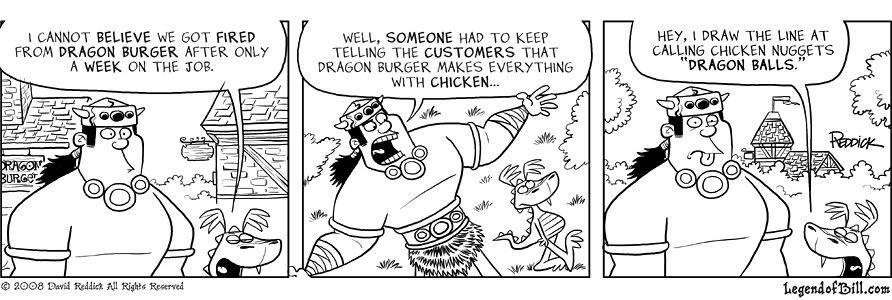
Strip 17: This little piggy went ouch!
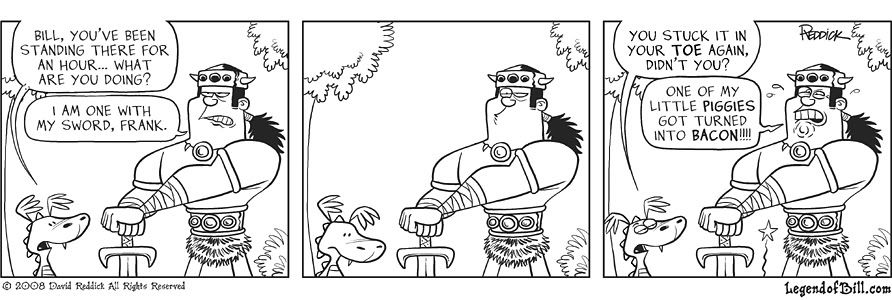
Strip 18: Meet Princess Gina!

Strip 19: Don't push the Princess!
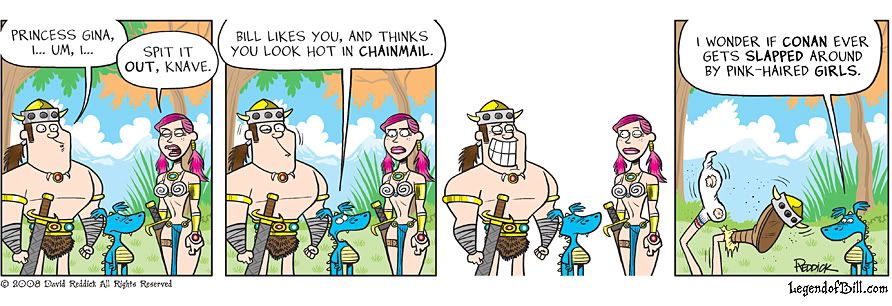
Strip 20: So what's this great quest?

-
Because some strips were missing from the original thread and a bunch of links were broken, I've started a new thread for Legend of Bill because it is easier than fixing the original. I'm also not going to put the strips in spoilers since the spoiler code always seems to need fixing after any board software upgrade which would make the strips unviewable. So here we go again...
Strip1: The Legend Begins

Strip 2: Intern Blues

Strip 3: Take This Job and Shove It!

Strip 4: Adventure awaits But first...

Strip 5: New Duds
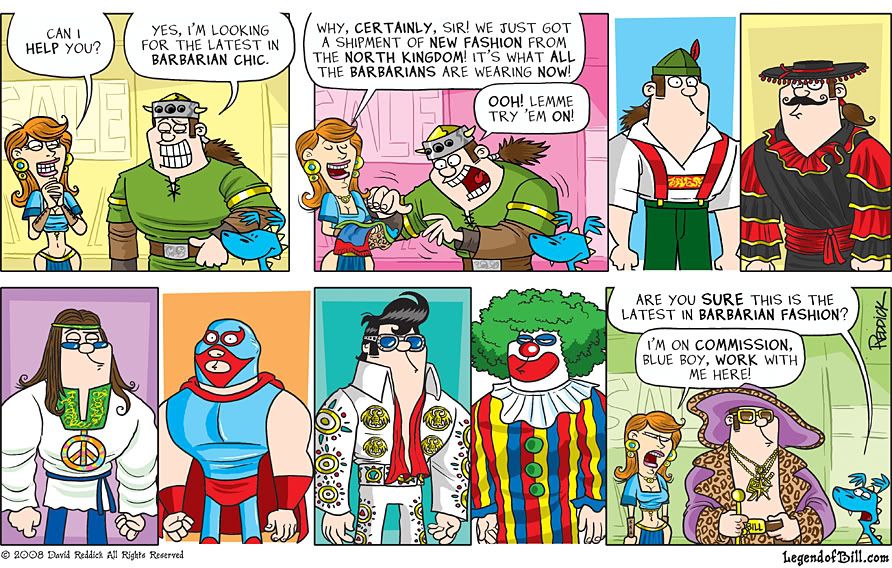
Strip 6: Barbaric Swordplay

Strip 7: One vital thing

Strip 8: Rule of Adventure #1: Watch your step

Strip 9: This is the life!
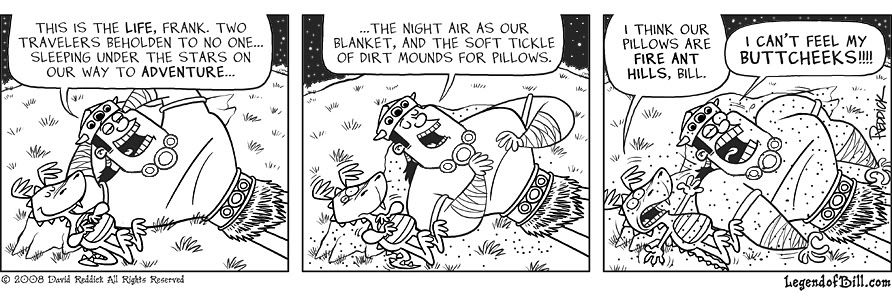
Strip 10: You wanna piece o'me?

-
-
-
-
-
-
Here's an obituary from the LA Times:
Karl Malden dies at 97; Oscar-winning actorBy Dennis McLellan
July 2, 2009
Karl Malden, a versatile Oscar-winning actor who built a six-decade Hollywood career playing heroes and heavies -- and, often, relatable ordinary men -- yet who was certain he was best known as a commercial pitchman for American Express, has died. He was 97.
Malden died Wednesday of natural causes at his Brentwood home, said Mila Doerner, a daughter.
He received his Academy Award for playing Mitch in the 1951 film “A Streetcar Named Desire,” a role he originated on Broadway. Two decades later, he starred in the 1970s TV series "The Streets of San Francisco" with Michael Douglas, then in his late 20s.
In a statement to The Times, Douglas called Malden a "mentor" whom he "admired and loved" deeply.
For more than 20 years, Malden was the spokesman for American Express travelers checks who turned "Don't leave home without them" into a national catchphrase in a series of commercials that debuted in 1973.
In a company that has become known for its celebrity spokespeople, Malden "was one of the first and most memorable," Joanna Lambert, a company vice president, told The Times in an e-mail.
Johnny Carson spoofed Malden's sober-faced ads on "The Tonight Show," and Malden often recalled that people were always throwing a version of the tagline -- "Don't leave home without it" -- back at him.
With his unglamorous mug -- Malden had broken his bulbous nose twice playing sports as a teenager -- the former Indiana steel-mill worker realized early on the course his acting career would take.
"I never thought I was salable," Malden recalled in a 2004 interview. "I learned in my second year of drama school that I was not a leading man -- I was a character actor. So I thought, I'd better be the best character actor around."
In a movie career that flourished in the 1950s and '60s, Malden played a variety of roles in more than 50 films, including the sympathetic priest in "On the Waterfront," the resentful husband in "Baby Doll," the warden in "Birdman of Alcatraz," the pioneer patriarch in "How the West Was Won," Madame Rose's suitor in "Gypsy," the card dealerin "The Cincinnati Kid" and Gen. Omar Bradley in "Patton."
The variety of the roles established Malden, former Times film critic Charles Champlin once wrote, "as an Everyman, but one whose range moved easily up and down the levels of society and the IQ scale, from heroes to heavies and ordinary, decent guys just trying to get along."
Eva Marie Saint, who worked with him in 1954's "On the Waterfront" and became a good friend, called Malden "a consummate actor."
He "never changed, he always became the character. If you watch his work, he never falls, there's never a false move," she told The Times on Wednesday.
Malden was a longtime holdout on television roles until he agreed to play Lt. Mike Stone on the ABC police drama “The Streets of San Francisco.” It ran from 1972 to 1977 and earned him four consecutive Emmy nominations.
He won his sole Emmy for portraying a man who begins to suspect that his daughter was murdered by her husband in the fact-based 1984 miniseries "Fatal Vision."
Although he could find his American Express fame "frustrating," the commercials gave him an actor's luxury: financial independence.
"I don't have to jump at anything and everything that comes my way," he said in 1989.
He was born Mladen Sekulovich in Chicago on March 22, 1912, the son of an immigrant mother from the nation that later became Czechoslovakia and a Serbian father, who was a milkman.
Malden spoke little English until his family moved from their Serbian enclave in Chicago to the steel-mill town of Gary, Ind., when he was 5.
Malden's father staged Serbian plays at church and in Serbian organizations in Gary. As a teenager, Malden often appeared in them and in plays in high school. He also played high school basketball.
After graduating in 1931, he spent three years working in a steel mill before deciding to enroll in the Goodman School of Drama at the Art Institute of Chicago.
At the school, he underwent strenuous training to rid himself of the remains of his Slavic accent. Malden also helped build scenery, took acting classes and appeared in plays.
The most important thing he learned, he later recalled, "was to enjoy working on a part."
After graduating from Goodman in 1937, he was too broke to pay $5 for his diploma. He worked briefly as a milkman in Gary, then headed for New York with $175 in savings.
In Manhattan, he met Harold Clurman and Elia Kazan of the Group Theater, a legendary repertory company, and debuted on Broadway in 1937 as a fight manager in a company production of Clifford Odet's "Golden Boy."
Kazan, who would play a prominent role in Malden's stage and film career, urged young Mladen Sekulovich to change his name. The actor devised his stage name by taking his maternal grandfather's first name and turning "Mladen" into "Malden."
He acted sporadically on radio and appeared in eight plays, but most ran for less than a month. There were long spells of unemployment, Malden recalled in his 1997 memoir, "When Do I Start?"
But there was an upside: In 1938, he married Mona Graham, an actress he had met when they were students at the Goodman School. They had two daughters, Carla and Mila, and remained together until Malden's death.
"I'm the happiest man in the world because of my family," Malden often said.
During World War II, he spent two years stateside in the Army Air Forces, mainly acting on Broadway in "Winged Victory," the Moss Hart show that raised millions for emergency relief. Malden also appeared in the 1944 film version.
Back in New York after the war, Malden's worries about restarting his stage career proved unfounded.
Kazan asked him to play a drunken sailor in Maxwell Anderson's "Truckline Cafe," which featured a young actor who mumbled during rehearsals: Marlon Brando.
In 1947, Malden broke through on stage playing the partner of a man (played by Ed Begley) who profits by making faulty parts for warplanes in the Arthur Miller drama "All My Sons," directed by Kazan.
Malden followed that up with an even greater stage success: his role as Blanche DuBois' awkward suitor in Tennessee Williams' "A Streetcar Named Desire," the Kazan-directed play that turned Brando into a Broadway star.
In his memoir, Malden said Brando "brought a reality to the stage that the theater had never witnessed before."
"Playing with Marlon consistently brought out the best in me," Malden wrote. "I guess, in the final analysis, it is impossible to beat genius, but it can be great fun to try to match it."
Malden played Mitch on stage for about two years, then reprised the role in the 1951 movie version, also directed by Kazan.
For his role as a tough waterfront priest in the 1954 Kazan film "On the Waterfront," Malden received a supporting actor Oscar nomination.
The character was based on Father John Corridan, whose church was near Hell's Kitchen on the Hudson River. Malden wore Corridan's hat and coat in the film and spent 11 days with the priest, who told him, "Just don't make me holier than thou; make me a human being."
A speech Corridan had delivered on the docks provided the core of the film in which Malden's waterfront priest encourages longshoremen to testify against union corruption.
As Malden recalled in 1991 in The Times, Corridan "was a Jesuit priest who taught law to the longshoremen. . . . The scene in the hold of the ship, he wrote at least 80% of that speech. A man came to him and said, 'Father John, I can't get a chit to go to work. Now I haven't gotten a chit in two months.' He says, 'You go in there and demand a chit even if you take it out of his hands. . . .' And the man did, and two days later he was found in the East River," nearly dead.
The man survived, but the next morning Corridan stood on a box on the dock and delivered the sermon that inspired Budd Schulberg's screenplay.
"Some people think the crucifixion only took place on Calvary. They better wise up," Malden's priest says in the film. "Every time the mob puts the crusher on a good man, tries to stop him from doing his duty as a citizen, it's a crucifixion."
Kazan also directed Malden in the 1956 movie "Baby Doll," Tennessee Williams' controversial story about the unusual marriage between a middle-aged man (Malden) and his teen bride, played by Carroll Baker.
Malden was one of the original members of the Actors Studio, formed by Kazan and others in 1948 after the Group Theater disbanded in 1941. After Kazan named names before the House Un-American Activities Committee in 1952, Malden remained friends with the director.
Because of Kazan's testimony, Malden wrote in his book, many mutual friends who turned on Kazan also refused to speak to Malden.
The actor, who claimed to have always been apolitical, wrote that he "never believed that politics had a place in art, that is to say, not in artistic relationships."
Malden said as much in 1999 when, as a member of the board of governors of the Academy of Motion Picture Arts and Sciences, he proposed that Kazan be awarded an honorary Oscar for lifetime achievement.
Film festivals, critics associations and the American Film Institute had refused to bestow similar honors on Kazan in his later years because of his House testimony.
"When I got up to talk, I suspected that there would be a big fight, but no one debated it at all," Malden later told The Times. "I said that I'm nominating a dear friend, and as far as I'm concerned, there's no place for politics in any art form. An award like this is about your body of work, and when it comes to a body of work, Elia Kazan deserves to be honored."
When Malden finished speaking, The Times reported, he was greeted by a rousing burst of applause.
Malden served as president of the academy from 1989 to 1992, during which he led the effort to remodel the academy theater in Beverly Hills and helped raise an endowment fund for the academy's Center for Motion Picture Study in the historic waterworks building in Beverly Hills.
As academy president, Malden also was required to speak at the annual Oscar-night ceremony seen by millions around the world.
There were no television cameras in 1952 when Malden accepted his best supporting actor Oscar for "A Streetcar Named Desire."
The day of the Oscar ceremony at the Pantages Theater, he was making the B-movie "Operation Secret," a World War II drama starring Cornel Wilde, at Warner Bros. He hadn't even planned to attend the ceremony.
But, Malden told The Times in 1991, someone from the front office went down to the set and said, "You're going to the Oscar show. You go to the wardrobe and get yourself a tuxedo. You're going."
Malden's wife and family were home in New York, and he drove to the ceremony alone in an old green rented Chevy. Embarrassed to see the limousines pulling up to the Pantages, he parked two blocks away.
As Malden recounted, "I had a coat because in New York you had a coat -- a topcoat -- and I walked in. Nobody knew me.
He put his coat in the adjacent seat before Humphrey Bogart and Lauren Bacall sat down. When Malden's name was called as a winner, he asked Bogart to watch his coat.
"He said, 'Get up there kid, take your Oscar.' . . . . About a half-hour later, I see Bogart holding an Oscar," for best actor in "The African Queen."
The first thing I said to him is, 'What did you do with my coat?' He said in nice words, 'Forget your coat, hold on to the goddamn Oscar.' "
In addition to his wife of 70 years and his daughters, Malden is survived by three grandchildren and four great-grandchildren.
-
I was enjoying my Canada Day so I haven't had a chance to post until now. I hope all our Canadian members had a great day.
-
I think it did happen. That's what I think made Data think would make the Borg Queen think he would give in.
Well, now that you mention that Data says that he hasn't used his skills for 8 years 7 months 16 days 4 minutes etc (I looked that up). And that is early 2373, so 8 years prior probably was 2364 ( 8 years prior to 2372) which is when the Naked Now takes place. So, based on that Data most likely had sex with Yar.
Data testified under oath in The Measure of a Man that he and Yar had been intimate so yes he and Tasha did have sex.
I still don't think the Borg Queen and Data could have sex because I don't think the Borg Queen's body was capable of it.
-
-
I don't see it as hyperbole, would Picard threaten Worf with being killed and having his brain removed if he disobeyed an order? In a serious situation where the Captain believes that the ship is in serious danger or some serious situation exists and his 2nd officer is lying to him and he is trying to gain the truth then every sentence he says has to hold weight and be truthful.When you look at it, Riker was in a very similar situtation to Data in season 7's The Pegasus. He was ordered by Admiral Pressman to keep information from Picard that affected the safety of the ship and crew. IIRC, Picard summoned Riker to his quarters because he thought Riker was witholding information. He didn't threaten Riker with death, only with removal as first officer of the Enterprise.
-
And for the life of me, about the original discussion, I cant remember but somewhere there is a mention that Maddox was the only Nay vote for Data to enter the academy. I honestly can't tell you if it was a instance of canon or non canon to even limit the things to look for. Something to the effect of him applying to enter the academy and there was a vote done to see if he was granted enterance. I would venture to guess that it would be similar to any in this century applying for college..It was said in this episode that Maddox had been the only one against Data entering Starfleet Academy.
-
-
-
-
-
-
If I'm not mistaken there's 176 episodes of DS9, each episode is roughly 45 minutes on DVD I believe so that works out to about 132 hours. There's 168 hours in a full 7 day week, so it'd be possible but that would only leave about 5 hours per day to sleep or do anything else.In other words, piece of cake!
-
-
Who says that the cop couldn't understand him? The cop doesn't say anything at all to him, just stares at him in disbelief as if he's thinking "We're in the middle of the cold war and this Russian is asking me to direct him toward our nuclear wessels??"But if the cop understood him, wouldn't he ask why a Russian was asking to be directed to a nuclear wessel? Another thing that makes you go "hmm". (Showing my age with that one.
 )
)I think he understood and was ignoring Chekov too but it is possible he didn't understand him.
-
Jeffrey Combs and Tony Todd have both been in a number of horror movies.

Legend of Bill
in The Works of David Reddick
Posted
Legend of Bill
Strip 41: All Hallows Eve
Strip 42: Sir Morton
Strip 43: The Dark Queen Cometh
Strip 44: Looking for a King
Strip 45: The Dark Queen Arrives
Strip 46: What the Dark Queen wants, the Dark Queen gets!
Strip 47: Nice Cookies
Strip 48: Snow
Strip 49: Merry Christmas from Legend of Bill
Strip 50: The Queen takes a King...